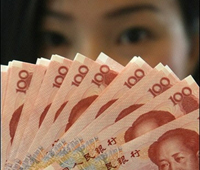Chinese economic expansion to buoy US trade outlook
Stronger-than-expected export growth last month has prompted market watchers to wonder whether the nation's trade outlook will be hamstrung by the slowing US economy, or buoyed by Chinese economic expansion.

Last week, the Ministry of Finance said the nation's exports rose 10.6 percent last month year-on-year to an all time-high of US$22.22 billion, citing increased demand from China and other Asian economies.
The ministry's tallies showed that Taiwan's exports to China rose 19.7 percent last month from a year ago. Shipments to Southeast Asia, meanwhile, increased by 19.1 percent and and those to Europe rose 10.8 percent. In comparison, exports to the US fell 8.3 percent year-on-year.
Nevertheless, the US remains a key destination for exports from Taiwan as well as from other Asian economies and the anticipated weak US demand as a result of turmoil in its credit market sparked fears of lower shipments from Asia and weakened business outlook for regional exporters.
But Matt Robinson, a Sydney-based economist at Moody's Economy.com, said in a report dated Oct. 11 that exports in Asia remained robust despite weak US demand. Robinson said this was because the expanding Chinese economy and growing intra-regional trade continued to offer much-needed support to the region's economic growth.
"Growth in intra-regional trade continues to boom, as evidenced in the Taiwanese case," Robinson wrote. "Despite a large proportion of intra-regional trade being for value-added and re-export purposes, the numbers suggest that the final purchasers of Asian-produced goods are increasingly consumers in Asia, particularly China."
However, some analysts disagree that China's strong growth will continue to cushion the rest of Asia.
Lehman Brothers economists Sun Mingchun and Rob Subbaraman said China is vulnerable to external shocks, despite its strong economic growth in recent years.
Moreover, they said the strong growth in China could be at the cost of other Asian economies, because of the development of direct competition instead of trade partnerships.
In their weekly economic monitor report issued on Oct. 11, Sun and Subbaraman cited two factors that have made China more vulnerable to external shocks.
"First, the economy has become more open and highly integrated with the global economy, especially after China joined the WTO in 2001," they said. "Second, weakening external demand could unmask severe overcapacity problems in China."
If China's external demand continues weakening, there will be increasing pressure for Chinese exporters to cut export prices to compete with other Asian exporters. Alternatively, China could focus inward leading to weaker demand for imported materials and components, the two Lehman Brothers economists said.
In any of these cases, "While China's trade surplus may be affected less negatively by weaker global demand, other Asian economies stand to bear the brunt," they said.
While shipments to China, including Hong Kong, accounted for 44.1 percent of Taiwan's total exports last month, the nation remains sensitive to US demand. Last month, exports to the US declined for a third-straight month (by 8.3 percent to US$2.63 billion), taipeitimes.com reports.
Treasury Secretary Henry Paulson, whose signature appears on every new dollar bill, may find the weak currency with his name on it helps the U.S. economy more than the strong one he publicly endorses.
The dollar's 8% slide during Paulson's 15 months in office is good news on the docks of Long Beach, Calif., where shipping containers are making their return trip to Asia filled with U.S.-made computer, auto and aircraft parts whose prices have become more competitive abroad. What's more, economists don't foresee the weaker currency generating higher import prices and accelerating inflation.
"The dollar is in a quasi-sweet spot," said Joseph Quinlan, chief market strategist at Bank of America Corp. in Charlotte, N.C. "It's dropped enough that it's creating an earnings upside for U.S. multinationals, while I expect many foreign companies to hold the line on prices they charge U.S. consumers."
Exports by General Motors Corp., Boeing Co. and other U.S. companies were up 11% in the second quarter from a year earlier, shrinking the nation's first-half trade deficit in goods by $14 billion, to $405 billion. Exports of goods grew more than twice as fast as imports in the first half of 2007, freep.com reports.
Source: agencies
Subscribe to Pravda.Ru Telegram channel, Facebook, RSS!

